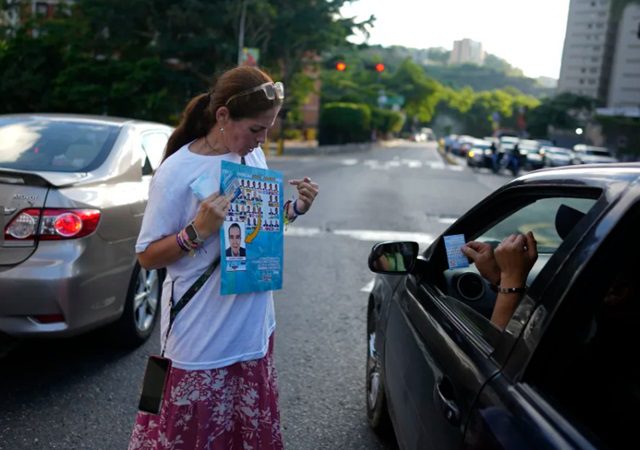BTN News: Tanyia Colmenares, with tears streaming down her face, recalls the shattered dream of becoming a lawyer, a dream cut short after just two semesters due to the harsh realities of the Venezuelan crisis. Despite never defending a client in court, Colmenares has now embraced a cause far greater: defending Venezuelan democracy in the upcoming presidential election on July 28.
Colmenares is among the thousands of opposition supporters who have rallied together, overcoming divisions to organize and mobilize voters for the crucial election. The primary opposition coalition is counting on these efforts, many led by political parties or spontaneous groups, to bring voters to the polls and discourage government representatives from intimidating or coercing voters.
Grassroots Efforts to Safeguard Democracy
In the absence of an independent electoral authority, these grassroots efforts are vital for the opposition’s ability to verify or contest the election results. The coalition, known as the Unitary Platform, believes that a strong voter presence at polling stations can help counter some of the ruling party’s tactics that have historically excluded opposition representatives from vote counting and oversight roles.
In Sabaneta, a city that symbolizes the heart of the Chavismo movement founded by the late President Hugo Chávez, Colmenares has joined forces with nine neighbors to ensure opposition supporters reach their polling stations. They are prepared to organize transportation, offer support at government checkpoints, and provide water or food to those waiting in long lines.
“Whether through social media, phone calls, messages, or in person, the important thing is to do the work and talk to the community,” said Colmenares, a housewife and mother of three, during a recent neighborhood meeting.
A Unique Election Landscape
This election is unlike any the ruling party has faced since Chávez was first elected in 1998 and began transitioning Venezuela to what he termed 21st-century socialism. Now led by Chávez’s successor, President Nicolás Maduro, the United Socialist Party of Venezuela (PSUV) is more unpopular than ever. Economic mismanagement, corruption, and low oil prices have plunged the country into an ongoing crisis, forcing many young people to abandon their university dreams, leaving children hungry, and driving millions to emigrate.
International sanctions aimed at ousting Maduro have failed but have exacerbated Venezuela’s decline. Opposition politicians, who previously boycotted elections they deemed rigged, have set aside their differences to unite behind a single candidate. Despite government repression, including the disqualification of Maria Corina Machado, who posed a significant challenge to Maduro’s campaign, the opposition remains resolute.
Machado, who won the coalition’s primaries overwhelmingly in October, now supports the coalition’s replacement candidate, former diplomat Edmundo González Urrutia. Pollsters estimate that up to 13 million people will vote on July 28.
Community Mobilization and Challenges
The opposition estimates that over half a million people have registered in informal neighborhood groups called “comanditos.” These groups, familiar with the PSUV’s efforts to skew election results, anticipate challenges such as closed gas stations, power outages in opposition strongholds, roadblocks by police and Maduro loyalists, and military restrictions at polling stations.
Some groups are fundraising by raffling prizes and selling hallacas, a tamale-like dish, to print promotional materials and prepare food for opposition supporters. Others store gasoline at home and offer their cars or motorcycles to transport voters. All have been instructed by the coalition to stay at polling stations after voting to reduce fear among citizens and ensure their representatives secure printed vote records from electronic voting machines.
“We have agreed as a comandito that after voting, we will monitor and ensure our votes are protected on July 28,” said local organizer Fidel Ortega during a group meeting. “With God’s help, we will defend our right to vote as Venezuelans. On the 28th, we vote; on the 29th, we celebrate, and from then on, we all win.”
Ortega estimates that opposition supporters have formed at least 40 neighborhood groups in the municipality that includes Sabaneta, a vast tropical plain. The government-controlled National Electoral Council has approved 36,000 voting machines, with many polling stations spread out, making it difficult for the opposition to monitor all of them. About one-third of voters in this election are assigned to centers with only one or two voting machines.
Historically, the PSUV has garnered most of its votes from these smaller polling stations. For this election, the electoral council added 1,700 single-machine centers. Reports of government efforts to coerce and control voting in previous elections have primarily involved these small polling centers.
Opposition Faces Risks and Hopes
Despite thousands of people joining neighborhood groups, fear of reprisals has deterred some opposition supporters from officially registering. However, they continue to participate through informal networks of friends, family, and colleagues, coordinating their efforts for July 28.
“We need to go with the people so they lose their fear,” said Edgar Cuevas, a high school teacher who will be at the polls on election day. “In the past, they would overwhelm us with their colectivos and their tactics, but now if 10 colectivos arrive, we will be 20.”
The upcoming election represents a pivotal moment for Venezuela, with the opposition striving to ensure fair and free voting amidst ongoing challenges. Their collective efforts aim to uphold democracy and bring about change in a nation yearning for stability and hope.


